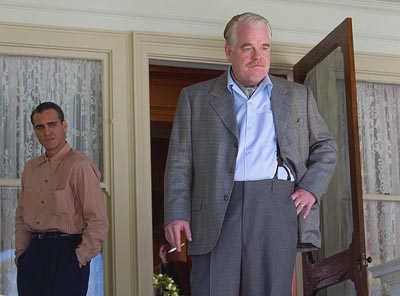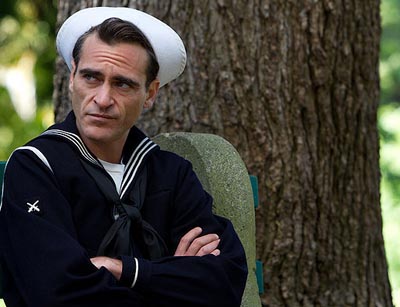 With the face of a gaunt, young Richard Burton by way of Neal Cassady, Paul Newman, and Montgomery Clift—Joaquin Phoenix sails beyond mere Oscar contention in The Master, and into an electrified circle of hell. The latest film from Paul Thomas Anderson—who has mined existential murk aplenty in There Will Be Blood and Magnolia this magic realist variation on the master-slave theme offers up its uneven insights in whopping 65mm, with cinematography by Romanian magician Mihai Malaimare.
With the face of a gaunt, young Richard Burton by way of Neal Cassady, Paul Newman, and Montgomery Clift—Joaquin Phoenix sails beyond mere Oscar contention in The Master, and into an electrified circle of hell. The latest film from Paul Thomas Anderson—who has mined existential murk aplenty in There Will Be Blood and Magnolia this magic realist variation on the master-slave theme offers up its uneven insights in whopping 65mm, with cinematography by Romanian magician Mihai Malaimare.
It is a war of masculine wills, between WW II veteran and über loser Freddie Quell (Phoenix) and oleoginous cult leader Lancaster Dodd (Philip Seymour Hoffman), who meet as improbably as they part. Without revealing the interconnective tissue, let’s just say that Quell stows away on Dodd’s ship one night, a ship that is sailing through the Golden Gate toward a fundraising tour of the East Coast. Quell is such a lush that he mixes dangerous alcoholic cocktails out of anything handy, including kerosene and other toxic ingredients. Dodd takes to the cocktails, and also to Quell—for reasons that only a psychiatrist well-versed in Nietzsche could grasp.  And the unlikely pair join up to help win more resources and recruits for Dodd’s cult—”the Cause”—of personal growth through regression hypnosis and tough love.
And the unlikely pair join up to help win more resources and recruits for Dodd’s cult—”the Cause”—of personal growth through regression hypnosis and tough love.
As pink, blonde and corpulent as Phoenix is dark, glowering and razor thin, Seymour makes an impressive partner in what amounts to a two-man battle for each other’s souls.
Always a resourceful, even cunning actor, Seymour has met his match in Phoenix. Bones jutting in every direction, Phoenix is armed with the hunched shuffling gait of a lifelong boozer, his jaw a probing weapon, his dark eyes hooded with even darker brows. His tightly-wound character is almost feral in his need. But Seymour, the alleged “master” is also deeply in need, though he can show it only indirectly Hence the two are conceptually joined at the hip. It might even be the case that they are the alters of a single, throbbing persona. And watching these two magnificent actors—surrounded by an impeccable supporting cast—is like feasting at a Roman banquet with unlimited seconds.
However. However. The film opens with opulent visuals and insights, soars into a first hour where the master and his new subject meet, bond, and begin their quest for insight into whatever it means to be a human being. And then—during its final half hour, when we are clenched, dripping, and ready for a denouement, or at least an emotional resonance—the film literally fizzles.
Just as the Master’s son reveals to Quell, “he makes this stuff up as he goes along,” so the film’s ending reveals that writer/director Anderson had no idea where he was going to take these intriguing characters. And so much—so much—would have been possible.
Here were two of our most powerful actors, willing to fling themselves across the screen, stripped bare of any inhibitions, and the director squandered their commitment. The scene where both men have been jailed in adjoining cells for some minor altercation with the cops, is a marquise-cut diamond. Phoenix’s character practically dismantles his cell with sheer animal rage, all the while wailing his anger at Seymour. And Seymour wails back until the two practically explode with some primal urgency that the actors have discovered deep beneath the surface of humanity. It is incredible stuff.
And it turns out to have been for nothing. The director neuters the power and intimacy of the drama between the two men by suddenly, for no cinematic reason, placing them outdoors on the salt flats of Death Valley. An action sequence occurs that starts the slide into generic, predictable, Hollywood ending. Only a director without wits would have taken the pressure cooker dynamic of a two-man psycho-drama into outdoor, action territory. And then have that vapid scene change morph into an ending any television writer on a deadline could have supplied.
The ending of The Master left me almost as angry as Freddie Quell without a drink.


I am so in agreement with you. In the end, there was no real spine to the story. As we were leaving, my husband said, “Well, that’s two hours of my life I could have spent elsewhere.” I asked him if there was even one character in the movie that he cared about – his answer was no and I agree.
Superb acting, great beginning, then flat.
You didn’t expect any real Kulchur to emanate from celebrity-ville, did you?